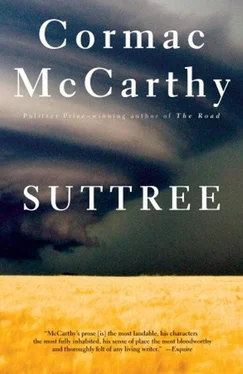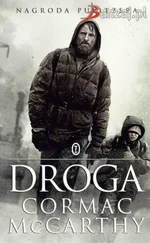He left it burning there and went as far as the edge of the light, his small shadow swallowed up finally in the greater dark beyond. He turned and came back. He squatted and watched the flame totter. The dank stone room grew smaller, drew in about him. He crouched in the smallest cup of light with his hands joined at the back of the flame as if he would gather it to him. Hot oil ran on the stones. The wick toppled and dropped with a thin hiss and dark closed over him so absolute that he became without boundary to himself, as large as all the universe and small as anything that was.
Suttree went by a wellrope down a dry brick cistern. Odor of earth and moss, the old brick dark and crumblesome. The floor of the cistern had fallen in and he went down a tailing of rubble and broken brick into a hole in the earth. He turned on the flashlight he carried and stepped down into the darkness.
He followed a narrow passage where the floor was mud and strewn with old bottleglass. The walls inscribed with names and dates scratched in the soft wet stone. The corridor narrowed and gave onto a drafty blackness where his light went from wall to far wall, an enormous and slaggy tureen traversed by plumbing. Great jointed runs of sewerpipe and tubes of cable cold and wet. He entered warily. No sound but a distant timeless dripping. He listened for any faint sound of traffic in the streets above but that world seemed gone altogether. The grotto lay like a sea cave, smooth and curving, a thing shaped to hold the wind where no wind was. He turned, his light going along the walls, the muddy flowstone and the high domed roof where hung stone teeth and tongues of wet black slag. He crossed the room, patches of dark sludge in the floor like pools of tar. At the far side a round tunnel went on through the rock and Suttree stooping followed after.
He searched the underground until he thought it must be evening and when he emerged again at the foot of the cistern he was surprised to find the day hardly half spent. He looked back down the cistern but he had no heart for going there again.
That evening he visited Harrogate’s diggings under the bridge but there was no sign he’d been there. He ran his trotlines before daybreak in the morning and went again to search for him.
He checked out narrow side passages and he watched the little mudspits in the cave’s stone floors for footprints but there seemed to have been no travelers here for years. The names and dates on the stone grew old. Cimmerians passed on without progeny. Some lack of adventure in the souls of newer folk or want of the love of darkness. His light ran over the ceilings, the carinated domes, stone scallopings and random hanging spires. The ribbed palate of a stone monster comatose, a great uvula dripping rust. Blades of false cuspidine. Hematite deep burgundy and loded with iron, clotted in the shape of stone offal. Or malachite in green coprolitic stools like small stone turds becrept a brassy green.
He found pale newts with enormous eyes and held them cold and quailing in his palm and watched their tiny hearts hammer under the blue and visible bones of their thimblesized briskets. They gripped his finger childlike with their tiny spatulate palps.
At the end of the day he came upon pieces of light in an upper wall of the tunnel and he squatted and listened and he thought he heard very faint and far the cries of children. He switched off the light and sat in the dark. He sat there for some time. The children’s voices went away. The three shapes of light on the floor of the cavern began to climb the farther wall. After a while he rose and went with his own light back the way he’d come.
On the fourth day he found footprints in a patch of gray loam. Tennis shoe tracks and big ones at that. He set his own shoe inside. A little further he found a fresh candybar wrapper. He passed through a large cavern where bats lined the roof, their leather elbows jostling in their sleep, a constant reedy murmuring of squeaks like those numberless cries that Bishop Hatto must have heard in his tower prior to being consumed by mice. Suttree pressed on, down the carious undersides of the city, through black and slaverous cavities where foul liquors seeped. He had not known how hollow the city was.
The air was becoming more tainted, a rising sulphur reek of sewage. Where this smell thickened worst he found the city mouse crouching. He was leaning against a wall and looking back down the tunnel toward the beam of light approaching. He looked like something that might leap up and scurry off down a hole. Suttree squatted in front of him and looked him over.
How about gettin that light out of my eyes, said Harrogate.
Suttree lowered the light. Their faces were blackened like miners or minstrels and the city mouse wore only shreds of clothing and he was covered with dried sewage. True news of man here below. He was looking down at the pool of light.
I thought I was dead. I thought I’d die in this place.
Are you all right?
There was people down here.
What?
There was people down here.
You were seeing things.
I talked to em.
Let’s go.
I hate for anybody to see me like this.
Suttree shook his head.
I’d give ten dollars for a glass of icewater, said the city mouse. Cash money.
Suttree would see her in the street, dawn hours before the world’s about. A hookbacked crone going darkly and bent in a shapeless frock of sacking dyed dead black with logwood chips and fustic mordant. Her spider hands clutching up a shawl of morling lamb. Gimpen granddam hobbling through the gloom with your knobbly cane go by, go by. Over the bridge in the last hours of night to gather herbs from the bluff on the river’s south shore.
He saw Jones all these summer evenings. Sat with friends under a caged windscrew the size of a plane’s prop and in the howling wind drank dripping beers and watched the cardplayers in their wet shirts mutter and smoke and deal. Jones spoke no more of the witch. Then one evening he leaned toward Suttree where he sat at the small marble table. Say she wont come down here? He said.
Who.
He snuffled. His eyes shifted but he seemed to be watching the cardtable. That old nigger witch, he said.
Ah, said Suttree. That’s what she says.
The black nodded.
Why dont you go up and see her?
He shrugged.
She said it wasnt yourself you wanted to see her about.
He looked at Suttree and looked back to the table again. Who she say I want to see her about.
Your enemies.
Ah, said Jones.
They went in the evening through the locust wood, insects so named screaming in the greenery, beneath great blooms of newsprint and into the steaming sink.
She was tending her garden, stooped with a hoe, a figure the size of a child. The homedyed black of her gown fugitive at back and shoulders from the sun. When she saw them she raised up and went into the house. They crossed the yard. Past the little rows of tomato plants and late runner beans. Suttree tapped at the door and they stood looking out at the little glade. After a while he tapped again.
When she came to the door she was bareheaded and she wore her spectacles. She stood aside for them to enter as if they’d been expected.
They followed her down the little hall in all but darkness toward an open door beyond which stood a table and a lamp burning. Jones stooped to enter, Suttree followed. They stood in the kitchen. Suttree looked about. The walls were hung with pictures, the pictureglass all dull with grease. He bent to study a clan of blacks, some thirty or more all formally aligned, old patriarchs and men and women and small children peering out and in the center seated and shawled what appeared to be a scorched rhesus monkey.
Читать дальше












